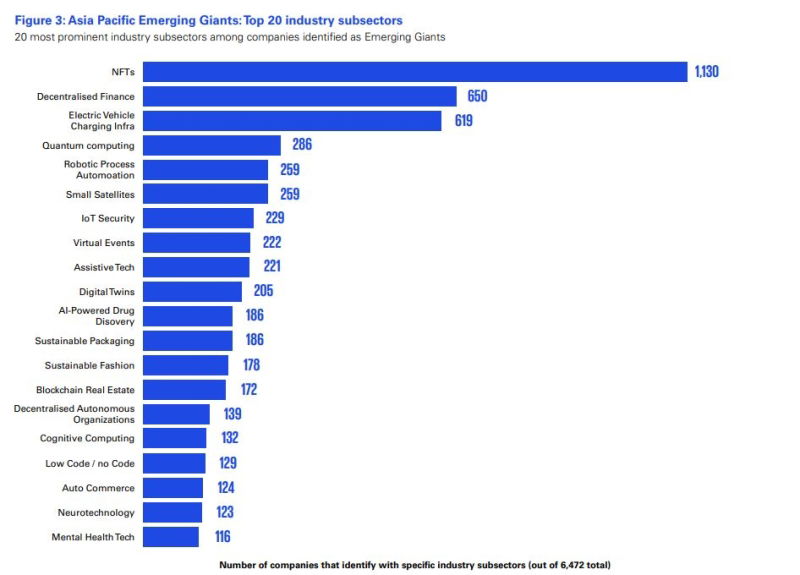



Study: What are the emerging sectors in the APAC start-up ecosystem?
share on
The Asia Pacific region has gone from being labelled as "the factory of the world", to being a region that possesses great potential for start-ups, especially for digital businesses. According to a study by KPMG and HSBC, the Asia Pacific region is home to a growing population, workforce and consumer class, with increasing digital literacy. The past few years saw a rapid accelerated adoption of digitalisation, caused by the pandemic, posing growth opportunities for start ups, especially for digital businesses.
Quoting an IMF forecasts in April this year, the study found that emerging and developing markets in APAC will grow 20% faster than the global average. With the improvement of consumers' access to the Internet and education, a new class of digital entrepreneurs have now emerged.
Where are these start ups emerging from?
KPMG and HSBC studied 6472 tech start ups that they saw as potential emerging giants in 12 key markets with valuations up to US$500 million. These key markets comprise Mainland China, India, Japan, Australia, Singapore, South Korea, Hong Kong, Malaysia, Indonesia, Vietnam, Thailand, and Taiwan. Most of APAC's emerging giants are concentrated in Mainland China, comprising 32.8% of APAC's market share, followed by India, standing at 30.1%.
Japan's tech start ups take up 12.7% of APAC's market, Australia takes up 8.7%, and Singapore comes in fifth, taking up 3.8%.

What are the emerging sectors?
Interestingly, start ups are now diverging from traditional sectors commonly associated with start ups, such as fintech and biotech, and NFTs came out on top. With the recent buzz around the metaverse and digital assets, more companies are taking steps to incorporate them into their businesses. For example, in APAC, Hong Kong-based game software company Animoca Brands completed a capital raise of US$75.32m to fund strategic acquisitions and advance the open metaverse, while on the agency side, communications agency W rolled out W3 in Asia which operates exclusively in the metaverse.
The increasing focus on the metaverse and digital assets have been drawing in more investments to start ups, and have been attracting top talents, which subsequently prompted governments to increase bring about improvements to their digital infrastructure in APAC. Recently, the Malaysian government introduced the Malaysia Digital initiative to support local tech companies to become ‘Malaysian Champions’ and successful international players and attract high-value digital investments, among others.
Public investment from governments can have a multiplier effect, boosting the confidence of private investor, the study found. About one quarter of the world's total private investment dollars comprise APAC growth companies, with start up business valued at over US$1 billion. The study has predicted that these growth companies would make a significant impact on the economy globally by 2030.

Sustainability subsectors are also prominent within the start up scene, with companies focusing on sustainable packaging, and fashion. Other than the buzz around the metaverse, consumers are now focused on businesses' sustainability efforts, garnering investors' interests. Just recently, content-to-commerce food brand DayDayCook and global venture accelerator Brinc committed to invest US$10m in food technology companies that are developing the sustainable, animal-free, global food ecosystem and scaling commercialisation in Greater China and Asia.
Other popular sub sectors include virtual events and auto commerce. Virtual events have also gained popularity during the pandemic, and have still maintained its popularity post pandemic.
What are the emerging trends for businesses in APAC's new economy?
The study found that there will be region-wide growth, with China remaining its dominant new economy, rivalled closely by India. Southeast Asia also has the potential of establishing itself as APAC's new dominant digital economy.
There is also currently a heavy focus towards B2C businesses, as compared to B2B businesses. Consumer facing companies and fintech will continue attracting the largest share of investment as eCommerce, payment, delivery, and personal finance platforms, often combined under superapps, are rolled out to serve emerging markets. Currently, the superapp competition in Southeast Asia is reaching its peak. Last month, Grab, one of the dominant players in this ecosystem rolled out a new enterprise service, GrabMaps to provide more hyperlocal solutions. Others such as AirAsia have also made their entry into the superapp space, and is pushing heavily into the food delivery arena. Indonesian ride-hailing firm GoJek is also another dominant player in this space.
However, the study suggested that after markets mature, the spotlight will be on higher value adding B2B start ups in areas such as enterprise productivity, education, healthcare and clean tech, with Australia pointing the way forward in many of these areas.
The growth of Asia's middle classes and emergence of GenZ consumers will also shape the future of businesses in the APAC region, said the report. Currently, with eCommerce on the rise, consumers are the biggest single driving factor across region. The study also predicts that there will be an increase in localised businesses. With APAC's diverse culture, societies, economies and politics, the rise of localised business models is not something that can be avoided.
Meanwhile, with the focus shifting to services from manufacturing, there will also be a spill over from the manufacturing sector, the study reported. Robotics and automation will play a role in the development of products at a faster and cheaper rate. With the rising importance of ESG, businesses will need to track carbon emissions, use renewable energy, and carry out sustainable responsibilities.
Related articles:
Govt unveils Malaysian Digital to replace MSC and address 3 priorities
Animoca Brands raises over HK$591m to advance open metaverse
Grab rolls out GrabMaps: A bigger push into location based marketing for B2B players?
DayDayCook and Brinc pump US$10m in food tech companies that promote sustainability
share on
Free newsletter
Get the daily lowdown on Asia's top marketing stories.
We break down the big and messy topics of the day so you're updated on the most important developments in Asia's marketing development – for free.
subscribe now open in new window
